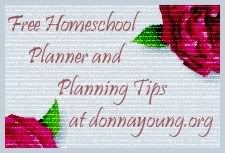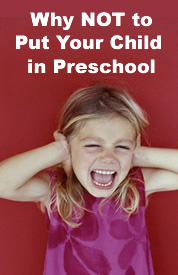We’ve all heard of the “Three R’s”: Reading, writing, and arithmetic. Most people believe that these are the basic building blocks of education for all children—even preschoolers.
But have you heard of the “Four R’s”? The four R’s are not only for preschoolers; they are for children of all ages. They are the real building blocks of education–especially for preschoolers. The four R’s include: Relationship, routine, readiness, and reading aloud.
Relationship is the first and most important part of any child’s education. Our first responsibility as parents is building a relationship of love and trust with our little ones. Once our children learn to love and trust us–ideally during infancy–we can begin to teach them how to have loving relationships with others. The most important relationship we can help our children develop is their relationship with God. (For more, see my tab on Relationship.)
Routine is the second building block. Preschoolers need a regular daily routine that they can rely on. They need to have regular times for meals, snacks, naps, and learning activities. Even older children rely on that sense of “what comes next”; it keeps them on an even keel emotionally. I’m not talking about a down-to-the-minute, oppressive routine; just a simple plan for the day that gives children security and regularity. (For example routines for children ages 2-3 and ages 4-5, see my tab on routine.)
Readiness: Children of all ages need to develop readiness before they tackle any new task. “Readiness” simply means that the child is physically, emotionally, cognitively, and spiritually ready for the experience. Readiness has everything to do with maturity…and since children mature in their own, God-given time-table, parents must learn to be patient and wait until their child is ready…no matter what their neighbor’s child is capable of.
Parents who wait for signs of readiness, interest, and even natural learning to take place will save themselves and their children hours of frustration.
Readiness is especially important during the first eight years of life. During this time, there is a vast range of “normal” development. That’s why homepreschooling/homeschooling works so well: Parents can individualize their children’s learning. Where their children are “ahead”, they can let them move them along without holding them back. In areas where their children struggle, they can slow down, relax, and give their children time to develop readiness.
Reading aloud: Reading aloud to your children is the single most important thing that you can do to help them learn. Reading aloud, and the discussion that goes with it, does more than teach the content of the book you’re reading: It also teaches pre-reading skills such as learning that letters make words, learning that print moves from left to right, learning to value and enjoy reading/language, learning the basics of grammar, learning correct pronounciation, and so on. It also is a great relationship builder!
I believe that these “4R’s” should be the foundation upon which homepreschooling/homeschooling rests. If these priorities are kept in perspective, everything else naturally falls into place. You may ask, “but what about the traditional 3R’s: Aren’t they important?!” Sure they are…once your child is developmentally ready for them. Most preschoolers aren’t. We have to remember that the curriculum in the public schools has been pushed down to the point that what used to be taught in Kindergarten is now taught in preschool, and what used to be taught in the first or even the second grade is now taught in Kindergarten. No wonder so many children are struggling in school! Preschoolers haven’t changed, but the curriculum has…drastically. Yet many parents expect their children to master it.
I take a different approach: I believe we should give the kids an old-fashioned, relaxed, play-based preschool/Kindergarten, and then slowly, over the years, notch those expectations up. You might say: Expect LESS of them when they are little, but MORE of them when they are older. Most public schools have it the opposite way: Expect MORE of them when they are little, but LESS of them when they are older.
This isn’t to say that preschoolers can’t learn. Preschoolers can (and do!) learn so much. In fact, if you take a look at the “skills lists” in Homepreschool and Beyond, you will probably discover a lot of things that you would never think that preschoolers could or should learn (especially about the Lord, or about nature, science, and the world around them.) In these areas especially, I think many parents underestimate their preschoolers. However,we need to remember that the way preschoolers learn is unique (they learn primarily through play,hands-on experiences, and through being read to and talked to) and the things they should learn are not simply their colors, numbers, and alphabet. There is a whole, vast world to explore, and preschoolers are very curious.
By using the foundation of the 4R’s, we can keep our priorities in order (make the main thing the main thing–relationships), and we can lay down a firm foundation for our children’s later years.
In my next post, I will briefly talk about specifics: What specific things do preschoolers need to be learning or doing, if not early formal academics?
© 2010, 2012 Susan Lemons all rights reserved.





